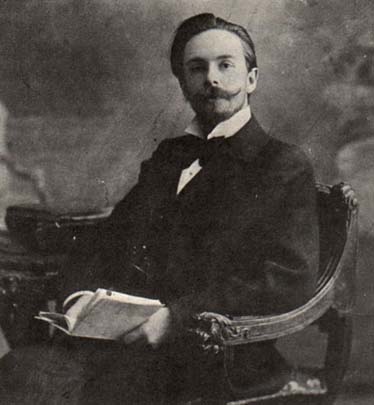Miami Piano Festival pays homage to Rachmaninoff and Scriabin in style

Music of Alexander Scriabin (above) and Sergei Rachmaninoff was performed at the final concerts of the Miami International Piano Festival.
The Miami International Piano Festival’s tribute to Scriabin and Rachmaninoff concluded Tuesday night with rare two-piano versions of orchestral scores and a duo keyboard classic.
Four pianists instead of the originally scheduled three shared the stage of the Broward Center’s Amaturo Theater. Booked to play the entire program, Ilya Itin suffered a hand injury while on tour. While he was able to play his solo recital on Sunday night, Itin could not practice for several days. He joined Zlata Chochieva for Rachmaninoff’s Suite No. 1 while festival veteran Kemal Gekic played the other two scores with Misha Dacic.
Playing works he had never performed in public before, Gekic proved to be a real trouper and managed to pull together performances that displayed his impressive technical arsenal and considerable interpretive depth. Russian composer-musicologist Leonid Sabaneyev’s reinvention of Scriabin’s 1911 Prometheus; The Poem of Fire was a fascinating curio. Sabaneyev does not attempt to approximate Scriabin’s extravagant orchestral color palette but he successfully transfers to the two keyboards the score’s strikingly original harmonies and unconventional rhythms.
The work opens with rumblings in the bass, a pianistic version of Scriabin’s mystic tritone chords. Harmonies pile on top of each other symbolizing light as brief thematic cells suggest Scriabin’s very personal brand of melody. Despite his last-minute substitution, Gekic mastered the off-kilter rhythms, playing with gleaming tone. He produced steely fortes in the agitated sections. In a well-coordinated effort with Dacic, the clanging dissonance of the score’s concluding pages was put across with blazing power.
The two-piano version of Rachmaninoff’s Symphonic Dances, his final work, was written concurrently with the familiar orchestral score. Rachmaninoff gave the first performance at a private party in Beverly Hills with no less than Vladimir Horowitz in 1942. The spare, leaner textures of the keyboard version project a greater sense of the music’s dark elements.
Gekic emphasized the staccato accents of the martial opening and the second movement Tempo di valse emerged as an elegiac valse triste. The dramatic initial chords of the third movement were followed by long pauses, maximizing dramatic effect. The unhinged Russian themes of the Allegro vivace were taken at a headlong clip. Gekic and Dacic offered a measured rendition of the central episode, more in the mood of the slow movements of Rachmaninoff’s sonatas and concertos, before dispatching the torrent of notes that concludes this variation on a staple of the symphonic repertoire.
For all the panache and skill of Gekic and Dacic, the finest performance of the evening was given by Chochieva and Itin in the Rachmaninoff suite. Chochieva made a striking debut at the festival’s Miami Beach series last May and played a highly praised recital on Sunday afternoon.
From the first bars of the opening “Barcarolle,” Chochieva’s bell-like tones avoided heaviness. She conveyed the repetitive arpeggios of the second movement’s seductive portrait of romance in a shapely manner. “Tears” (the third movement) was grandly rhapsodic, the melodic writing traced with delicacy and the soft shadings adding color. Encompassing the second piano part with skill, Itin was the consummate professional. Chochieva and Itin’s tonal palette was beautiful in duo passages. Chochieva set a fast tempo for the motivic cells symbolizing the ringing bells of Russian Easter in the finale, and Itin produced massive power and volume at the conclusion. Chochieva and Itin should be heard together again in a full program when both pianists are healthy.
______________
Dacic had the stage to himself Monday night for an all-Scriabin program in commemoration of the 100th anniversary of the composer’s death. The program traced the composer’s progression from his earliest works in the style of Chopin through his abandonment of key signatures to his late embrace of mysticism and a very personalized form of atonality.
The Fantasy, Op. 28, which opened the concert, is the work of a 19-year composer very much under the spell of Rachmaninoff, Tchaikovsky and romanticism. Dacic darted through the knuckle-busting octaves in an appropriately large-scaled reading.
The Chopin imitations of some early preludes and mazurkas were followed by the very different melodic and harmonic strands of the Etude No. 4 in F-sharp minor, Op. 42, announcing a new sound world and creative aesthetic.
The program’s second half presented works from the composer’s later period when he abandoned traditional keys and assigned colors for each of the twelve notes of the scale, a musical form of synesthesia. These preludes and poemes’ unmoored harmonics and lack of formal structure are seconded by fierce technical demands and stream of consciousness creativity. The fire-infused Poeme No. 1, Op. 71 and slow stasis of Guirlandes No. 1 suggest Scriabin’s embrace of philosophy and spirituality.
The generous program concluded with the Sonata No. 7 (“White Mass”). The sheer originality of this score remains astounding. Relentlessly violent with moments of calm and lyrical rumblings, the music’s power, primitivism and suggestions of atonality mark this work as one of Scriabin’s most remarkable creations. It is a work that played to Dacic’s strengths of speed, volume and textual accuracy. The entire program was a riveting survey of one of the most original creative voices in the history of Western music.
The Miami International Piano Festival Discovery Series presents Rachel Cheung, Raluca Stirbat, Sarina Zhang and Leonid Egorov May 14-17 at the Colony Theater in Miami Beach. miamipianofest.com
Posted in Performances
Leave a Comment
Wed Mar 25, 2015
at 12:48 pm
No Comments






